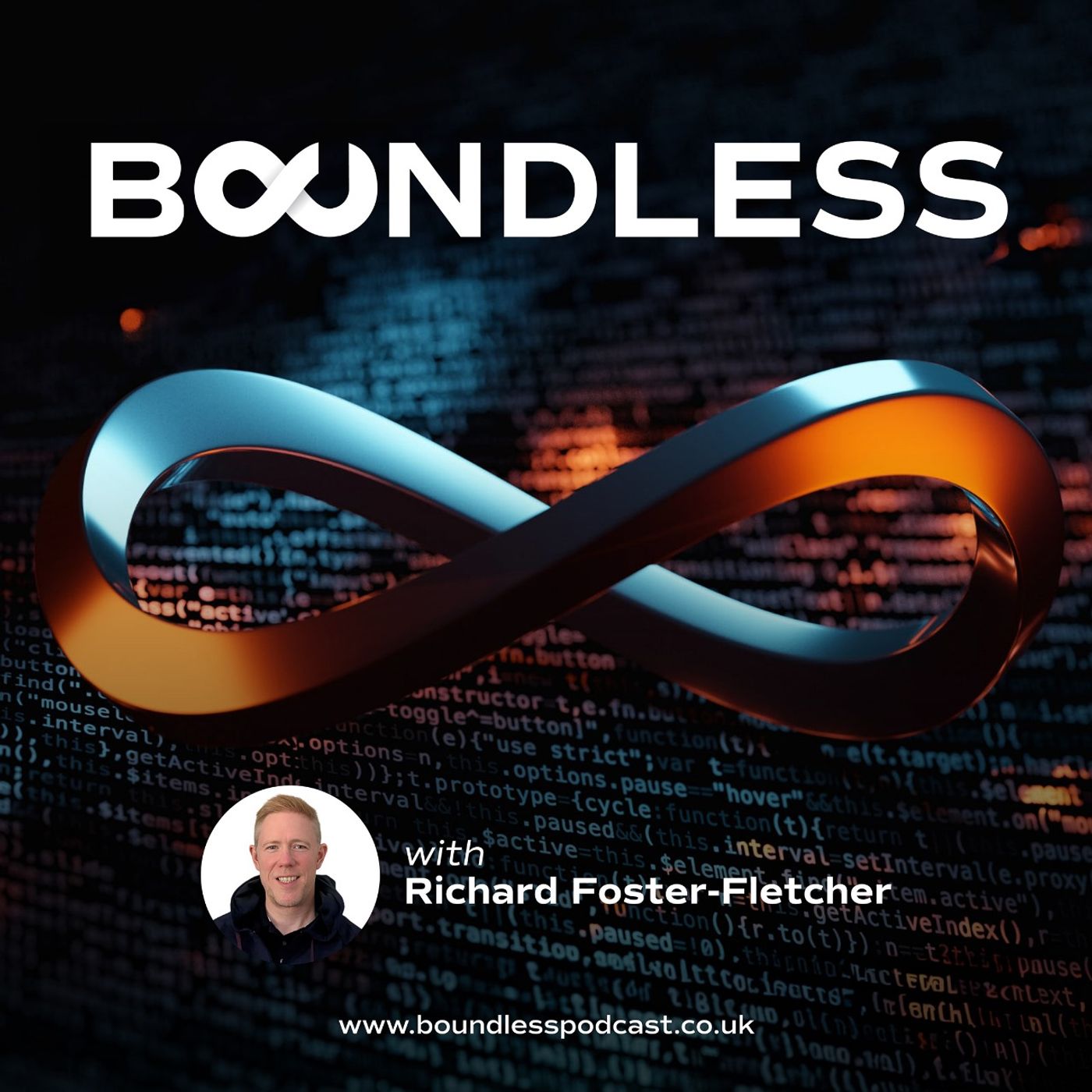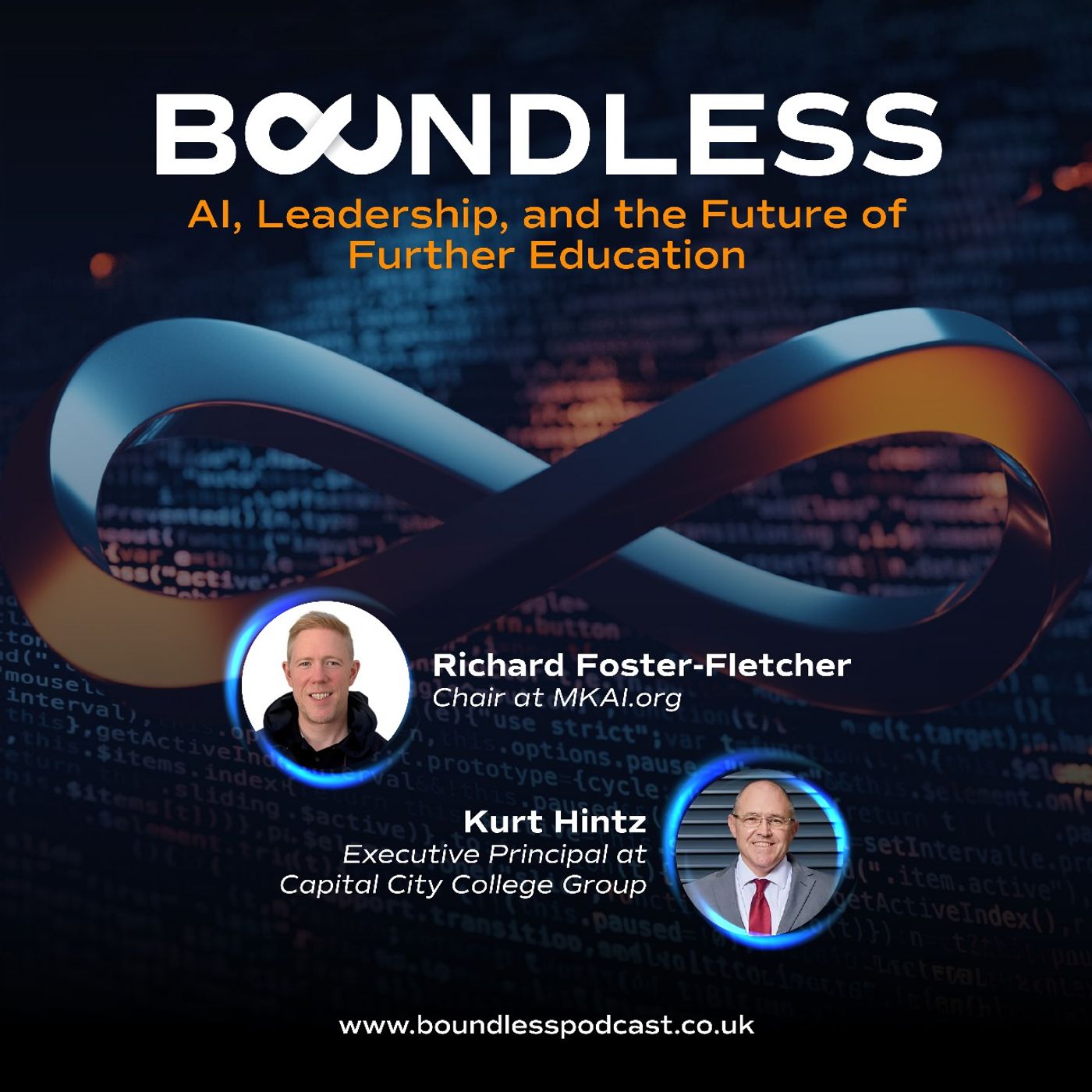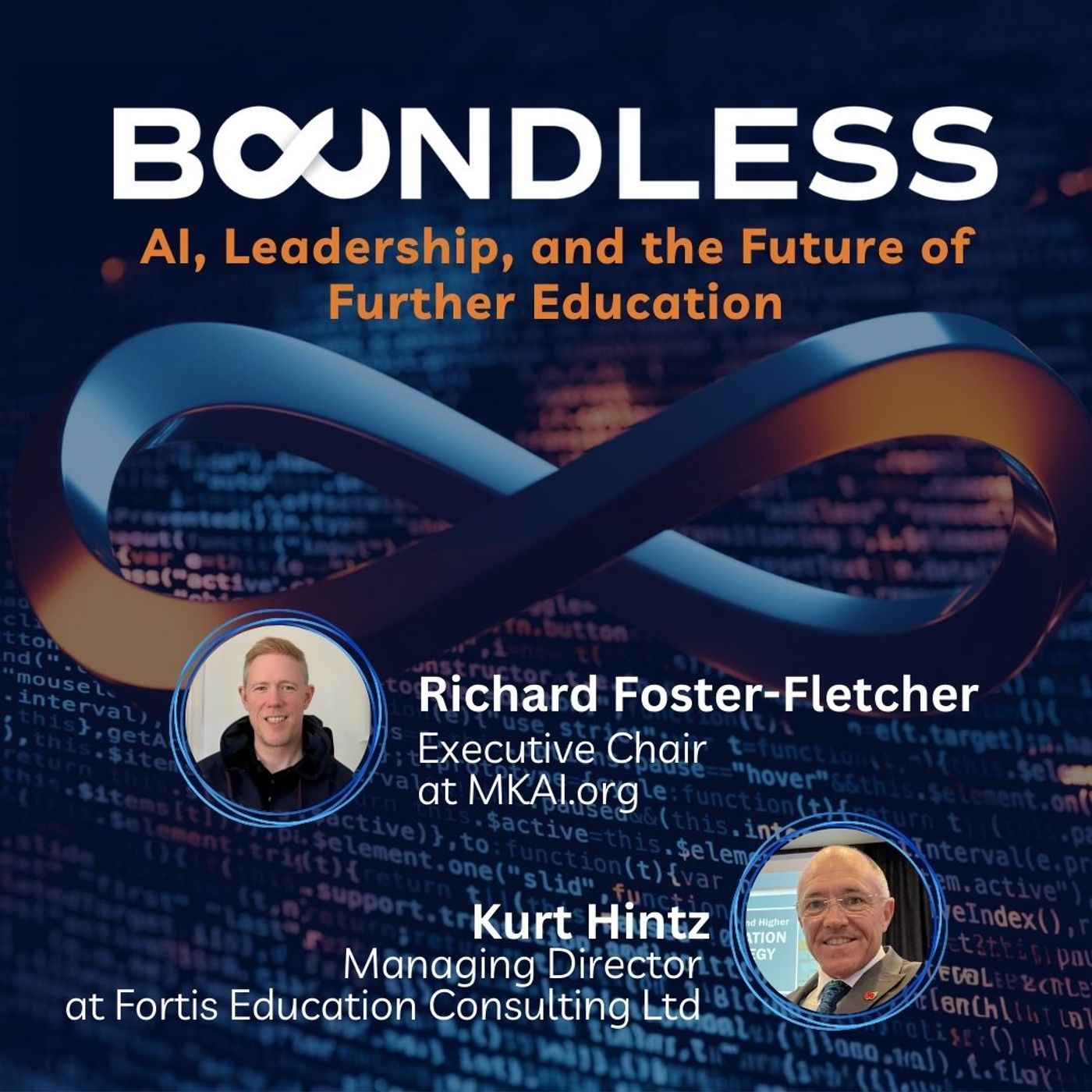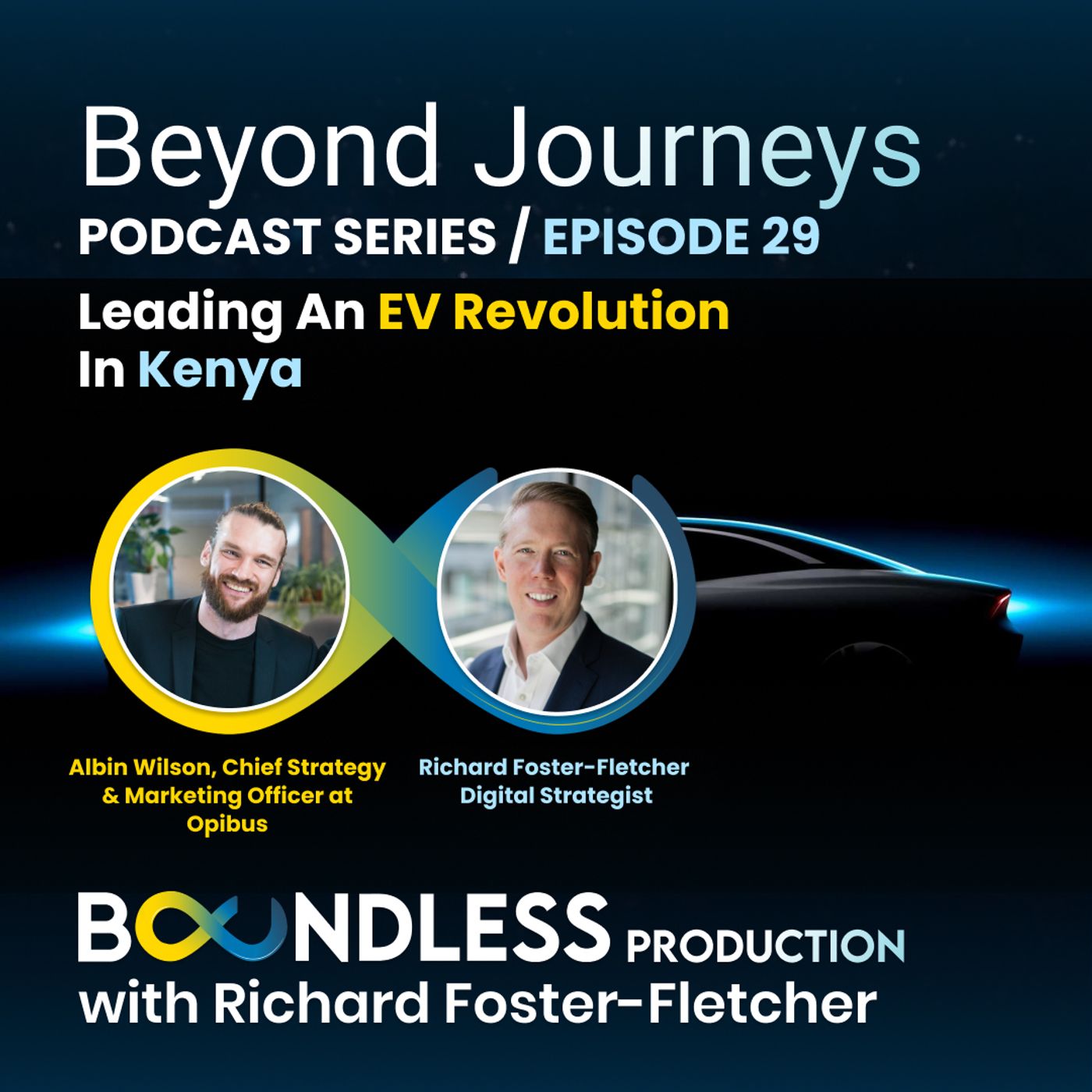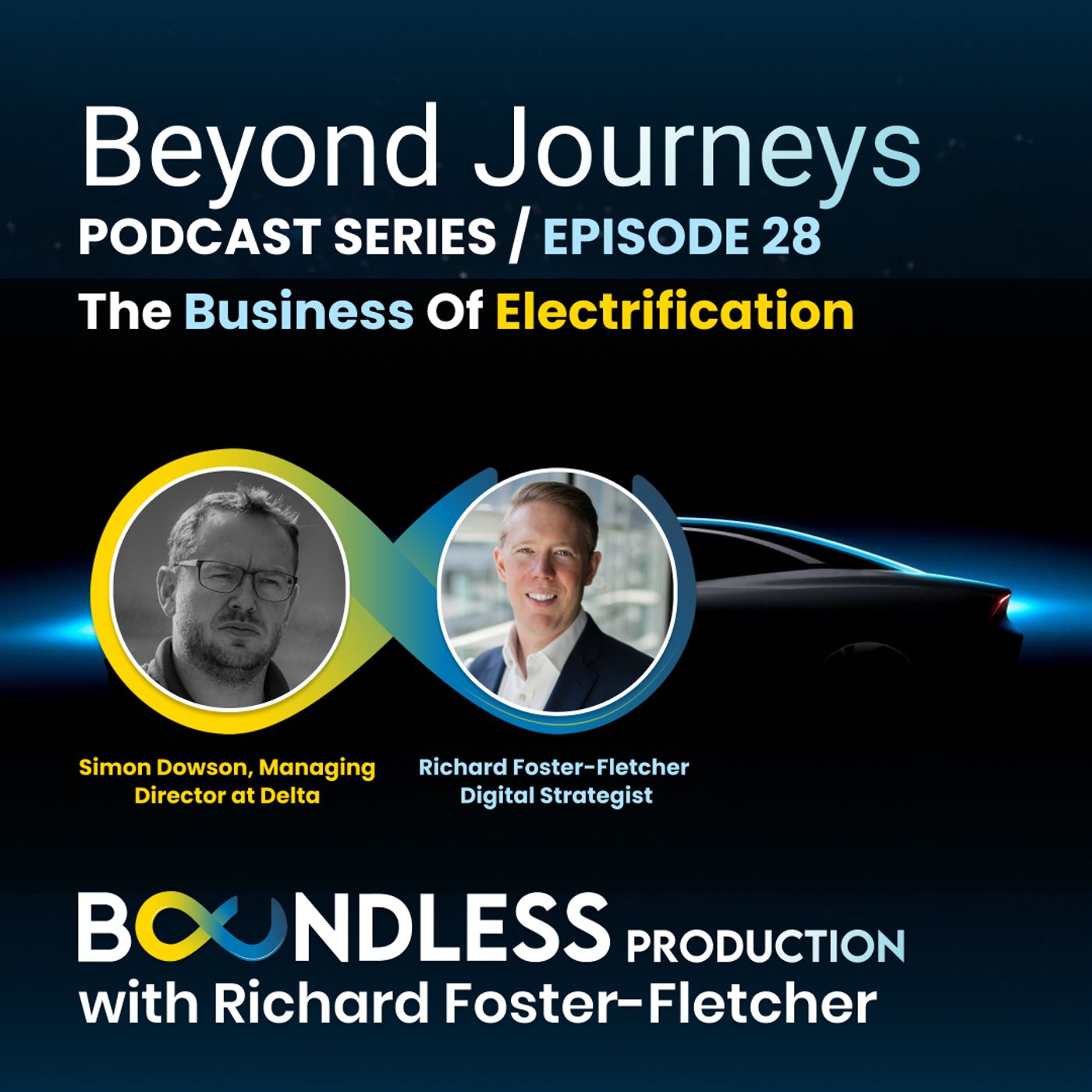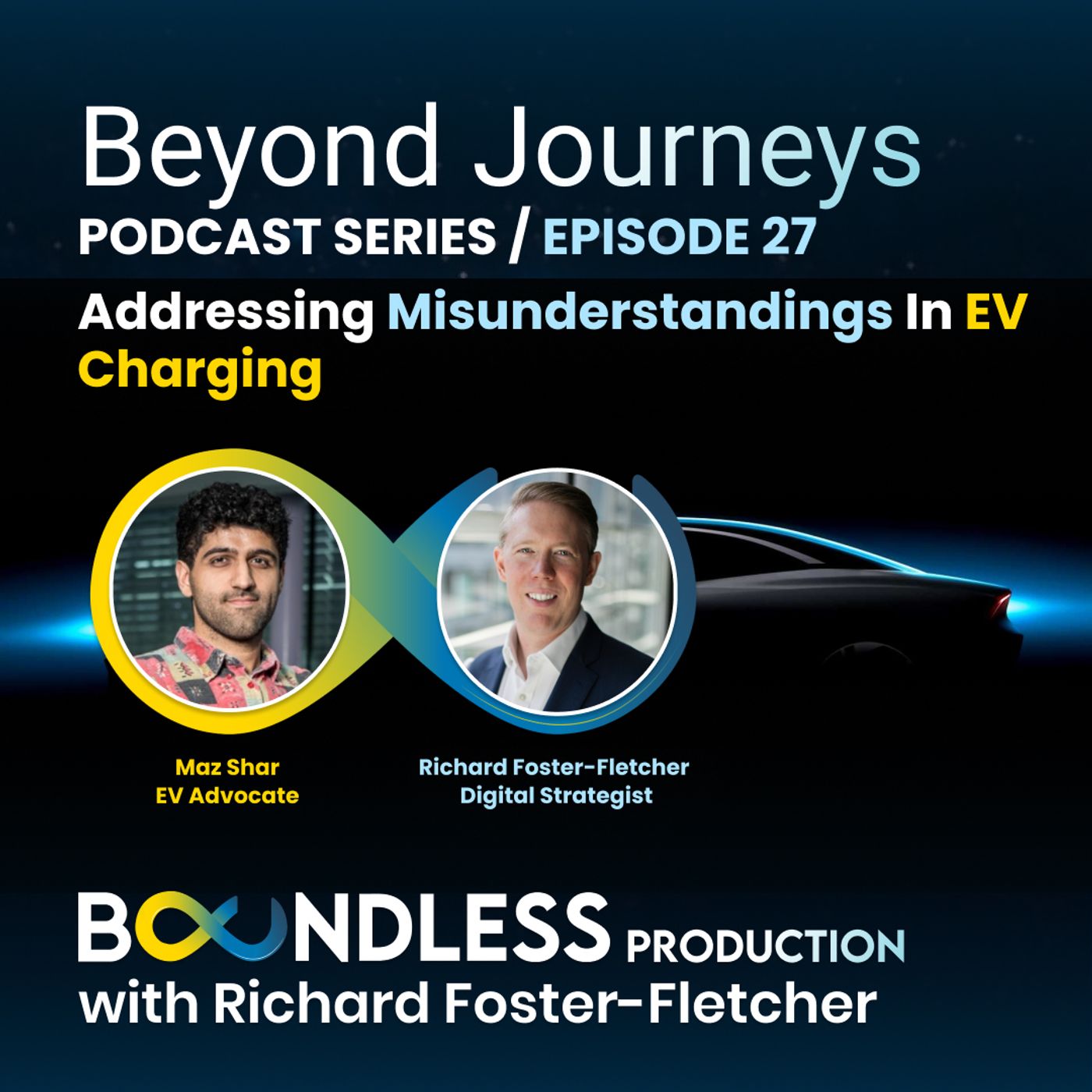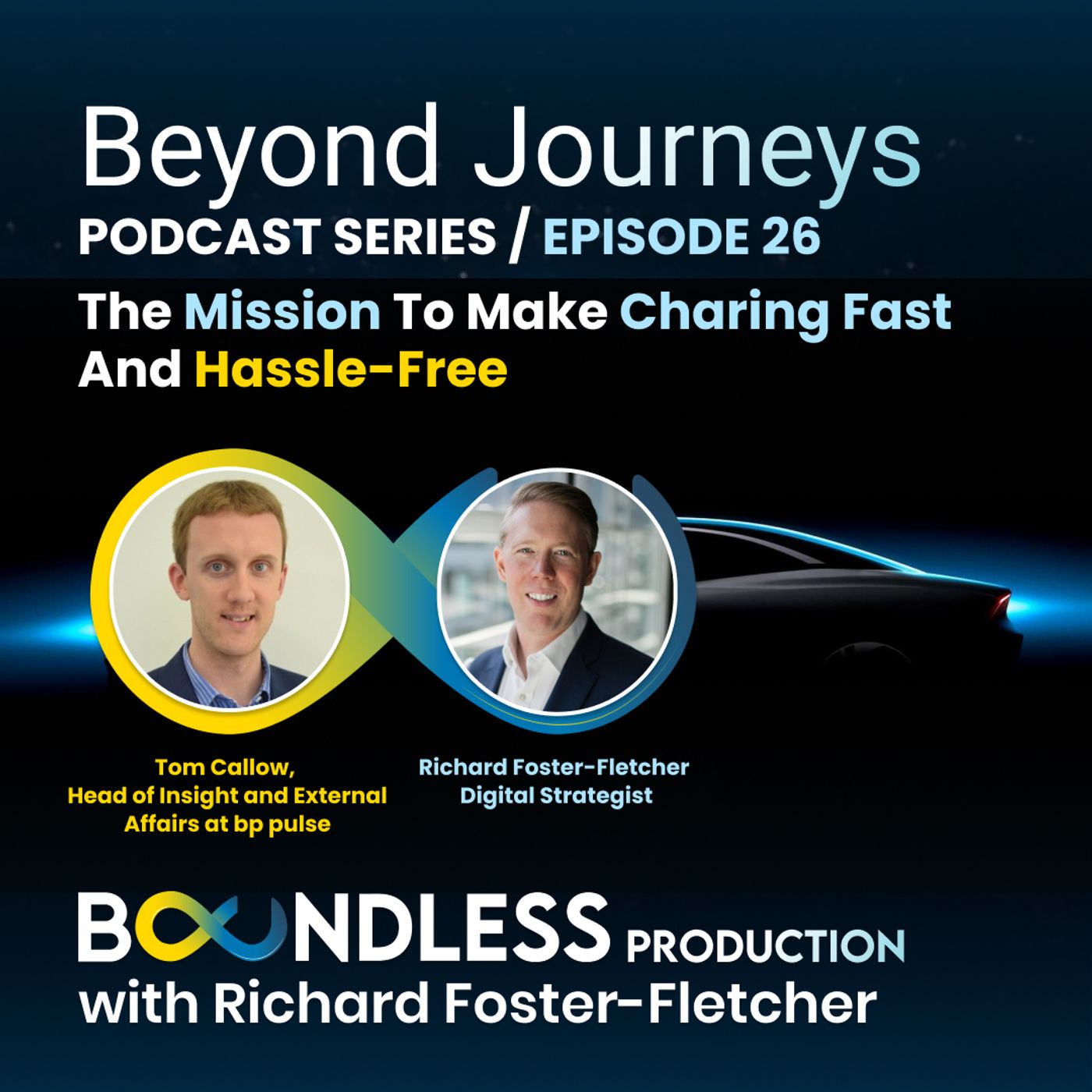Discover The Boundless Podcast
The Boundless Podcast

The Boundless Podcast
Author: Richard Foster-Fletcher
Subscribed: 9Played: 151Subscribe
Share
© Richard Foster-Fletcher
Description
Shaping Our Digital Destiny, hosted by Richard Foster-Fletcher, offers an in-depth examination of artificial intelligence. The series aims to elucidate how we can optimise AI's capabilities for societal benefit while establishing safeguards to ensure these technologies augment rather than dominate human potential.
Become a supporter of this podcast: https://www.spreaker.com/podcast/the-boundless-podcast--4077400/support.
Become a supporter of this podcast: https://www.spreaker.com/podcast/the-boundless-podcast--4077400/support.
244 Episodes
Reverse
Series: Artificial Intelligence, Leadership and the Future of Further EducationWith:Richard Foster-Fletcher, Executive Chair, MKAI.orgKurt Hintz, Executive Principal, Capital City College GroupConrad Taylor, Business Learning & Technologies Manager, The City of Wolverhampton CollegeDr. Adam Dwight, Lecturer in Teacher Education and Learning Innovator, The City of Wolverhampton CollegeEpisode 12: Embracing Digital Transformation: Insights from The City of Wolverhampton CollegeEpisode Overview:In this episode, Richard Foster-Fletcher and Kurt Hintz engage in a comprehensive dialogue with Conrad Taylor and Dr. Adam Dwight from City of Wolverhampton College. The discussion illuminates the college's strategic approach to digital transformation, highlighting the innovative integration of AI and technology in teaching and learning processes. The conversation delves into the pivotal roles that Conrad and Adam play in spearheading digital initiatives, shedding light on the transformative impact of technology on student engagement and educational outcomes.Key Topics of Discussion:The pathway to digital transformation within the education sector, emphasising the initiatives spearheaded by the City of Wolverhampton College.The dynamic role of technology in reshaping educational experiences, with a focus on personalised learning and digital skill development.Insights into the leadership strategies that drive successful technology integration in further education settings.Recommendations from the Episode:Adopting a Forward-Looking Approach: Emphasising the importance of visionary leadership in navigating the complexities of digital transformation in education.Fostering Collaborative Innovation: Highlighting the significance of collaboration among educators, technologists, and students to maximise the potential of digital tools in enhancing learning.Empowering Through Digital Literacy: Stressing the necessity of equipping both students and educators with digital competencies to thrive in a technologically advanced educational landscape.This episode serves as an inspiring exploration of the challenges and opportunities presented by digital transformation in further education, offering valuable insights for educators, leaders, and policymakers committed to leveraging AI and technology for educational excellence.Become a supporter of this podcast: https://www.spreaker.com/podcast/the-boundless-podcast--4077400/support.
Series: Artificial Intelligence, Leadership and the Future of Further EducationWith:Richard Foster-Fletcher, Executive Chair, MKAI.orgKurt Hintz, Executive Principal, Capital City College GroupIan Pryce CBE, Former CEO of Bedford College GroupEpisode 11: "AI Innovations and Leadership: The Bedford College Group's Journey"Episode Overview: In this episode, the conversation focuses on the transformative role of AI in further education. Ian Pryce shares his insights from his tenure at Bedford College Group, discussing how AI and digital technologies have been integrated into the curriculum. The discussion, led by Richard Foster-Fletcher and Kurt Hintz, explores the challenges and opportunities of implementing AI in further education.AI Integration at Bedford College Group: Ian Pryce talks about Bedford College's journey in integrating AI into their system, highlighting the use of the Century computerised system to enhance online study. The conversation delves into the impact of this AI tool in supporting both staff and students, and how it has helped to advance personalised learning and improve teacher efficiency.Embracing AI for Future-Proofing Education: The dialogue sheds light on how the Bedford College Group is preparing students for future challenges through AI. It discusses the role of AI in shaping new educational paradigms and the importance of equipping students with relevant digital skills.Challenges and Ethical Considerations: Pryce, Foster-Fletcher, and Hintz discuss the ethical implications and practical challenges of integrating AI in education. They touch on the importance of balancing technology with traditional teaching methods and ensuring equitable access to digital resources.The episode concludes with a focus on the importance of leadership in driving technological change in education. It highlights the need for continuous innovation and adaptability in the face of rapidly evolving AI technologies, ensuring that further education remains relevant and effective in preparing students for the future.Become a supporter of this podcast: https://www.spreaker.com/podcast/the-boundless-podcast--4077400/support.
Series: Artificial Intelligence, Leadership and the Future of Further EducationWith:Richard Foster-Fletcher, Executive Chair, MKAI.orgKurt Hintz, Executive Principal, Capital City College GroupGraham Bell, the Director of Digital Education at Cranfield School of ManagementEpisode Title:"Strategies for Executive Education in the Age of AI"Date of Recording: 19th Jan 2024Episode Introduction:In this insightful episode, we delve into the evolving role of Artificial Intelligence (AI) in higher education and leadership. Joined by Graham Bell from Cranfield School of Management, we explore how AI is shaping the educational landscape, its implications for leadership, and the unique challenges and opportunities it presents. This discussion is essential for educators, leaders, and anyone interested in the intersection of AI, technology, and education.Guest Bio:Graham Bell, the Director of Digital Education at Cranfield School of Management, brings extensive experience in integrating digital technologies in educational settings. With nearly 30 years at Cranfield, Graham has been at the forefront of employing emerging technologies to enhance learning and teaching experiences. His insights into the use of AI in education are particularly relevant in today's rapidly evolving technological landscape.Topic 1: Cranfield University's Unique ApproachDiscussion on Cranfield's postgraduate-only structure and its focus areas including management, aerospace technologies, and involvement in addressing grand challenges like climate change.Topic 2: AI's Role in Education and LeadershipExploration of how AI is impacting decision-making and learning processes in educational institutions, and the challenges leaders face in adapting to these rapid technological changes.Topic 3: Future Predictions and Horizon ScanningDebate on the difficulties of predicting future tech trends, particularly in AI, and the importance for organizational leaders to stay informed and prepared.Topic 4: AI for Augmentation and UpskillingDiscussion on the potential of AI to augment jobs rather than replace them, focusing on how AI can enhance productivity and learning experiences.Become a supporter of this podcast: https://www.spreaker.com/podcast/the-boundless-podcast--4077400/support.
Series: Artificial Intelligence, Leadership and the Future of Further EducationWith:Richard Foster-Fletcher, Executive Chair, MKAI.orgKurt Hintz, Executive Principal, Capital City College GroupPaul Levy, Writer, thinker, conversifier, collusion breakerEpisode 8: AI and Conscious Leadership in EducationShow Notes:In this thought-provoking episode, hosts Richard Foster-Fletcher and Kurt Hintz are joined by writer and technosophy expert Paul Levy to discuss the promises and perils of AI integration in education.Key topics covered include:The need for ethics and purpose to guide rapid AI advancement, beyond commercial drivers alone. Education cannot solely optimise for efficiency metrics.Risk of over-reliance on generative AI leading to helpless dependence once systems are unavailable. Critical thinking capability may erode without balanced human-AI collaboration.Education's aim transcends employable skills to nurturing self-actualisation. Policymakers and corporations cannot impose convenient narratives about automating learning.Discernment needed on appropriate AI applications - some scenarios warrant replacement, others damage the human condition. Judgment of long-term impacts essential.Importance of motivation, curiosity, discovery and confidence-building in human development, beyond AI's purview currently. Risk of instrumentalist view stripping joy of learning.Possibilities for AI to enhance critical thinking assignments rather than replacing essays outright. Designing nudges towards excellence over mediocrity.Ensuring emerging technologies improve equity, accessibility and inclusion rather than exacerbating divides.Far from inevitable dystopia or utopia, the episode offers balanced perspectives on risks, opportunities and responsible leadership needed to craft an AI-powered education system aligned to student welfare.Become a supporter of this podcast: https://www.spreaker.com/podcast/the-boundless-podcast--4077400/support.
Series: Artificial Intelligence, Leadership and the Future of Further EducationWith:Richard Foster-Fletcher, Executive Chair, MKAI.orgKurt Hintz, Executive Principal, Capital City College GroupDebra Gray MBE, Principal and CEO, Hull CollegeEpisode 7:Transforming Educational Paradigms for the AI EraEpisode Overview:OverviewIn an insightful discussion with Debra Gray, this episode of "AI, Leadership and the Future of FE" dives into Hull College's journey of digital transformation and the broader implications of AI in education. Hosted by Richard Foster-Fletcher and Kurt Hintz, the conversation spans from digital innovation to the cultural shift required in embracing technology in education.Digital Transformation and AI Integration at Hull College:Debra Gray outlines the significant digital transformation at Hull College, detailing the strategies employed to enhance digital infrastructure across departments. This transformation is centred around supporting learners and preparing them for future roles in various industries, including engineering. The conversation also sheds light on how AI tools, such as Chat GPT, are being embraced as productivity tools rather than feared, marking a significant shift in educational approaches.AI Academy and Future-Proofing Students:A key focus of the discussion is the implementation of Hull College's AI Academy, designed for staff training and student programs. Debra illustrates how AI is utilised in various areas like marketing, report writing, and safeguarding, enhancing the overall educational experience. This approach aligns with the broader goal of future-proofing students, equipping them with digital skills that are increasingly sought after in the job market.Cultural Shifts and Efficiency Gains:The episode also explores the necessary cultural change among educators in adapting to digital advancements. Debra discusses her approach to encouraging this shift, emphasising the potential of AI to enhance efficiency. She highlights tools like Teacher Matic, which have revolutionised resource generation, allowing teachers more time to engage with students.Responding to the Evolving Job Market:The discussion with Kurt brings to the forefront the adaptability and responsiveness required in skills development amidst AI advancements. They deliberate on the historical context of job transformations due to industrial revolutions, underscoring the importance of adapting education to meet these evolving demands.Collaboration and Knowledge Sharing:A recurring theme in the episode is the necessity for increased collaboration and knowledge sharing within the further education sector. The discussion concludes with an emphasis on the importance of maintaining a student-centric approach in education, ensuring alignment with industry needs and fostering entrepreneurial and problem-solving skills among students. This approach, facilitated by AI tools like Chat GPT, is crucial in preparing students for a dynamic job market and fostering collaboration in the education sector.This episode serves as a comprehensive exploration of how digital transformation, spearheaded by forward-thinking leaders like Debra Gray, is reshaping the educational landscape, highlighting the need for flexibility, collaboration, and student-centric strategies in further education.Become a supporter of this podcast: https://www.spreaker.com/podcast/the-boundless-podcast--4077400/support.
Series: Artificial Intelligence, Leadership and the Future of Further EducationWith:Richard Foster-Fletcher, Executive Chair, MKAI.orgKurt Hintz, Executive Principal, Capital City College GroupDr. Sean Mackney, Principal and CEO at PetrocEpisode 6: Equal Opportunities in the Digital AgeEpisode NotesThis episode centres on the pivotal role of artificial intelligence (AI) in shaping equal opportunities in the education sector, with a special focus on further education and leadership. Discussions range from how AI could democratise access to quality education to its ethical considerations.Objectives:To discuss AI's potential to level the playing field in education, especially in further education.To examine the governmental policies around AI's impact on education and lifelong learning.To explore the ethical considerations of AI in educational settings, particularly in terms of inclusion and analytics.Key Discussions:AI's Potential in Education and LeadershipRichard, Sean, and Kurt explore the untapped potential of AI to bring equality in educational opportunities. Sean is optimistic that AI could particularly assist those from disadvantaged backgrounds, providing a supportive structure for learning.AI's Potential in Education: Group-Fetch and Cognitive OffloadSean and Kurt touch upon how AI can aid in personalised learning experiences. Sean brings up the concept of 'group-fetch' and deep relationships, while Kurt discusses 'cognitive offload' to ease complex tasks.AI's Impact on Education and Lifelong LearningSean brings attention to the governmental view of AI across sectors, urging caution that the pace of technological advancements could outstrip societal adaptation. He advocates for policies like universal income to offset AI's unpredictable disadvantages.Adapting to AI: The Future of Skills and CareersSean and Kurt delve into the necessity for career adaptability in an AI-driven landscape. Sean speaks about the need for switching careers in the case of automation, exemplified by a bricklayer adapting to drone operation.Colleges as Anchors in the Age of AIThe panel addresses the role of colleges as community anchors, contributing to productivity and equal opportunities. Kurt and Sean emphasise the ethical use of data and AI by colleges and call for government frameworks to guide this.GPT-4 Release and Productivity BoostSean talks about the upcoming release of GPT-4, predicting improvements in productivity. He also hints at the possibility of governmental policy mandating access to mobile hardware and speed.Inclusion, AI, and EthicsSean and Richard focus on the importance of inclusion and ethical engagement with AI and data. They debate the potential benefits and risks of AI in this context.Ethics and Learning Analytics in Higher EducationThe discussion turns towards the ethical dimensions of learning analytics. While Sean expresses reservations about how these tools could potentially limit personal growth, Kurt sees them as useful for tracking skills and behaviours.Action Items:Implement ethical guidelines for AI in educational settings.Lobby for governmental frameworks that promote the ethical use of AI.Encourage a balanced approach that values both technological advancements and ethical considerations.The episode serves as a comprehensive guide for educators, policymakers, and thought leaders on the importance and complexity of integrating AI into the educational landscape. It stresses the need for a careful, well-considered approach.Become a supporter of this podcast: https://www.spreaker.com/podcast/the-boundless-podcast--4077400/support.
Series: Artificial Intelligence, Leadership and the Future of Further EducationWith:Richard Foster-Fletcher, Executive Chair, MKAI.orgKurt Hintz, Executive Principal, Capital City College GroupScott Hayden, Head of Teaching, Learning and Digital, BCoTEpisode 5: Balancing AI and Human Interaction in EducationEpisode NotesThis episode delves into the intricate balance between utilising Artificial Intelligence and maintaining human-centric approaches in education. Our guests discuss the potential benefits and pitfalls of incorporating AI tools into teaching practices, professional development, and assessment.Highlights:Challenges Amid COVID-19: Kurt Hintz discusses the difficulties education is facing due to the pandemic, including behavioural issues among students.AI in Professional Development: The conversation explores AI-enabled coaching for educators, focusing on its potential benefits for professional development.Objectivity vs. Bias in Assessment: Scott Hayden shares his experience with using AI for marking assignments and discusses the objectivity it offers in comparison to human bias. He also talks about the need to rethink assessment methods to include more authentic forms, such as vlogs and blogs.The Human Factor: Kurt Hintz questions the implications of AI in soft skills development, especially in engineering roles. Both Scott and Kurt emphasise the importance of "being the human in the loop" when using AI tools.Technology and Human Interaction: The panel discusses the balance needed between technology and human interaction in education. Richard Foster-Fletcher raises concerns about people becoming engrossed in their phones at the expense of personal relationships.Ethical Considerations: Scott Hayden stresses the importance of ethical safeguards when using AI tools, particularly for younger audiences. The conversation also touches on the addictive nature of some AI coaching tools and the need for balance.Digital Well-Being: Scott acknowledges the challenge of managing screen time addiction, citing examples from a college module he conducted on digital well-being.Action Items:Educators and policy makers should consider implementing ethical guidelines for the use of AI in educational settings.Schools should focus on creating a balanced approach that leverages technology while not compromising on human interaction.Further discussion is needed to explore the potential future advancements in AI and its impact on education.This enlightening conversation provides a nuanced view of the role of AI in education, urging caution and thoughtful implementation to benefit both educators and students.Become a supporter of this podcast: https://www.spreaker.com/podcast/the-boundless-podcast--4077400/support.
Series: Artificial Intelligence, Leadership and the Future of Further EducationWith:Richard Foster-Fletcher, Executive Chair MKAI.orgKurt Hintz, Executive Principal, Capital City College GroupEpisode 3: Future-Proofing FE Institutions: Leadership strategies to integrate and adapt to advancements in Artificial Intelligence. Episode Notes:In this episode, Richard and Kurt delve into the importance of leadership strategies and future-proofing in the context of artificial intelligence (AI) in further education (FE). They set the stage for an engaging dialogue on the complexities and responsibilities tied to the implementation and ethics of AI.Leadership in AI and Future-Proofing:Kurt and Richard begin by discussing their upcoming leadership session and its focus on preparing for AI's transformative impact on education and society. They stress the need for a comprehensive understanding of AI’s potential harms and risks. The emphasis is on a dialogue-driven approach to addressing these challenges, ensuring leaders are actively involved in AI implementation to prevent potential damage.Structured Implementation and Ethical Challenges:The conversation shifts to the vital aspects of implementing AI in education, with Kurt highlighting the need for structured policies, systems, and focus. Richard brings attention to the challenges related to AI ethics, underscoring the importance of transparency, external validation, and accountability in AI development.Navigating Complex Ethical Considerations:Both speakers acknowledge the complexity of ethical considerations in AI, touching on issues like biased language generation by generative models and the cultural differences that impact ethical decision-making. They concur that navigating these complexities is not just difficult but essential for responsible AI deployment.Empowerment, Sustainability, and Equity:Kurt emphasises the critical role of empowered and knowledgeable staff in educational settings. He prompts leaders to be inquisitive about data usage and technology development. Richard agrees and extends the discussion to smaller businesses that could benefit from AI, highlighting the importance of ethical considerations, sustainability, and equity in AI applications.Future Education and Ethical Implications:The discussion concludes with Kurt expressing enthusiasm about the potential for further education funding to enable rapid adaptability in AI adoption. Both speakers underline the need for ethical considerations in influencing AI's role in education, particularly concerning its impact on children's lives and societal structures.This episode serves as a comprehensive guide for FE leaders, equipping them with the insights needed to navigate the complicated landscape of AI in education responsibly.Become a supporter of this podcast: https://www.spreaker.com/podcast/the-boundless-podcast--4077400/support.
Series: Artificial Intelligence Leadership and the Future of Further EducationWith:Richard Foster-Fletcher, Executive Chair MKAI.orgKurt Hintz, Executive Principal, Capital City College GroupEpisode 2: The Classroom of Tomorrow: A look into how Artificial Intelligence could influence our future learning environments in Further Education. Episode Notes:Kurt and Richard open the episode by discussing various elements currently affecting Further Education, including emerging technologies like Chat GPT and Neuralink, the implications of AI in classrooms, and pressing concerns about inequalities within educational systems. The conversation also touches upon the financial aspects and potential disruptions to established educational hierarchies.Richard queries Kurt about the availability of college-wide WiFi, focusing on the accessibility for students without data. Kurt confirms the presence of free WiFi across the campus, designed to facilitate learning while also offering some degree of protection when accessing social media. The discussion then shifts towards the role of AI in education, specifically as a tool for delivering education and imparting industry-standard skills. Richard posits the idea of a future classroom devoid of physical devices, relying instead on projected information. Kurt underlines the critical role of seamless interconnectivity between individuals and information sources.Kurt shares his concerns about the responsible application of AI in educational assessments. He argues for the need for tools that can both alleviate the workload on teachers and offer rapid, quality feedback essential for personalised learning. Kurt underscores the importance of addressing existing inequalities in the educational system to achieve true equity for all learners. He also notes the increasing number of companies approaching him with AI solutions, particularly for assessment and planning, while cautioning that companies falling behind in AI advancements risk obsolescence.Further, Kurt speaks about the symbiotic relationship between Further Education institutions and businesses, stressing the importance of foundational technical training that can evolve into more advanced skill sets. Richard adds to this by discussing AI's role in administrative streamlining, such as in the automation of fee assessments. Both delve into the necessity of optimising learning spaces, examining variables such as lighting and temperature and even the synchronisation of class schedules with peak cognitive times for individuals.Closing the episode, Kurt and Richard discuss the complexities introduced by remote work. They explore its effect on both individual learning experiences and organisational structures. The duo also ponder how AI can play a role in shaping optimal learning environments, from monitoring student engagement to fostering collaborative learning settings. This rich conversation illustrates the nuanced considerations involved in integrating AI into Further Education while striving to meet each learner's unique needs.Become a supporter of this podcast: https://www.spreaker.com/podcast/the-boundless-podcast--4077400/support.
New series: Artificial Intelligence Leadership and the Future of Further EducationWith:Richard Foster-Fletcher, Executive Chair MKAI.orgKurt Hintz, Executive Principal, Capital City College GroupEpisode 1: AI and Personalised Learning: Exploring how Artificial Intelligence might enhance the individualised learning experience Episode Notes:Kurt Hintz and Richard Foster-Fletcher discuss their roles in AI implementation in education, with Kurt taking on an educational leadership role and expressing concerns about its implementation. Both participants express support for AI but acknowledge the need for careful consideration in its use. Kurt shares his background as an educator and his interest in using technology to maximise the potential of education. Richard explains his motivation for working in AI and the need to navigate complex scenarios with the help of AI. They both emphasise the importance of preparing students for jobs that may not even exist yet due to rapid advancements in AI. Richard discusses the impact of artificial intelligence (AI) and ChatGPT on education. He highlights how students can use AI to write essays, create marketing materials, and develop business plans.Kurt emphasises the need for educators to adapt to this technology and ensure that students are at the forefront of its usage. They discuss how AI tools can enhance productivity without necessarily replacing jobs entirely. They also explore the shifting importance of knowledge in a world where information is readily accessible through technology. The conversation touches on future episodes that will delve into topics such as personalised learning, harnessing technology in education, future-proofing institutions, and data privacy concerns. Richard discusses the balance between natural human capabilities and learned behaviours in dealing with a larger number of people. He asks if having smart glasses that identify people's names and information would be useful or intrusive. Kurt expresses his enthusiasm for such technology, as it would help him remember names and personalise interactions. They discuss the expectations of knowing people's names in a large organisation and how personalisation can enhance relationships. Kurt suggests that AI skills are becoming essential in various industries, including education, and educators need to incorporate these skills into their teaching. Richard highlights the potential challenges of generative AI tools like text generation but also recognises their value when used creatively by skilled individuals. They emphasise that AI is just a tool that complements human creativity and thinking. The conversation touches on job displacement concerns but also presents opportunities for those who adapt to new technologies. Lastly, they mention the importance of personalisation in classrooms and introduce the topic of personalisation basics. Richard and Kurt discuss personalised learning and the potential impact of AI on it. Personalised learning involves having a personal coach who provides constant feedback and support. It aims to adapt teaching methods to each student's individual needs and pace. The traditional model of personalised learning existed in apprenticeships, where individuals received one-on-one guidance. However, implementing this in a classroom with multiple students is challenging but possible through differentiation. AI can potentially enhance personalised learning by constantly measuring an individual's progress against competency frameworks, eliminating the need for point assessments. This approach allows for continuous measurement of skills and abilities at an individual level.The discussion also addresses whether traditional assessment methods adequately prepare individuals for real-world work environments that involve deadlines and consistent performance over time. Additionally, the conversation highlights how AI tools can support teachers by reducing their administrative workload related to assessments, allowing them to focus more on building strong relationships with their students. Become a supporter of this podcast: https://www.spreaker.com/podcast/the-boundless-podcast--4077400/support.
Series: Artificial Intelligence, Leadership and the Future of Further EducationWith:Richard Foster-Fletcher, Executive Chair, MKAI.orgKurt Hintz, Managing Director, Fortis Education ConsultingMichael Webb, Director of Technology and Analytics at JiscPaul McKean, Director of Further Education and Skills and Training at JiscEpisode 13: Navigating the New Frontiers: AI's Role in Further Education with JiscEpisode Overview:In "Navigating the New Frontiers: AI's Role in Further Education with Jisc," we venture into the transformative realm of AI in education. This episode, featuring insights from Jisc's Paul McKean and Michael Webb, delves into the delicate equilibrium between AI and human intervention, the democratisation of learning through personalised AI tools, and the challenges and opportunities presented by generative AI technologies like ChatGPT. We explore how AI is reshaping educational landscapes, enhancing communication and social skills, and redefining academic integrity. Join us for a thought-provoking discussion on AI's burgeoning impact in further education.Key Topics of Discussion:In the latest episode of "Navigating the New Frontiers: AI's Role in Further Education with Jisc," we delve into pivotal discussions surrounding AI's integration into education. Our conversation pivots around several key areas:The Balancing Act: We examine the crucial balance between AI's capabilities and the invaluable human touch in education. The dialogue opens up on the complexities surrounding formative assessments aided by AI and the ensuing debates on grade inflation, underscoring the necessity for a thoughtful approach to integrating AI in assessments.Accessibility Challenges: Addressing access disparities, the discussion highlights the importance of ensuring equitable access to AI tools, connectivity, and devices. The freemium models of generative AI tools potentially widen the digital divide, raising concerns about equal opportunities for all learners.Cognitive Offloading and Assessment Evolution: The conversation explores the shift towards cognitive offloading to AI tools like calculators and how it necessitates a re-evaluation of assessment criteria. This segment contemplates the expectation for students to delve deeper into their subjects, thanks to AI's support.Empowering Educators and Learners: Finally, we spotlight the transformative potential of AI in democratising education. With examples like the use of visual AI to enhance language skills, the episode illustrates AI's role in catalysing learning and levelling the educational playing field for all, including those with learning difficulties.The AI resources from Jisc are available here.Become a supporter of this podcast: https://www.spreaker.com/podcast/the-boundless-podcast--4077400/support.
Series: Artificial Intelligence, Leadership and the Future of Further EducationWith:Richard Foster-Fletcher, Executive Chair, MKAI.orgKurt Hintz, Executive Principal, Capital City College GroupDavid W. Sime: CTO and Co-Director of Riiot Digital, Technical Director at Riiot HealthEpisode Title:"AI and XR at the Forefront: Reshaping Education with David Sime"Date of Recording: 12th Jan 2024 Guest Bio:David Sime brings 23 years of expertise in digital communications technology, focusing on the intersection of Education with AI, VR, AR and IoT. Having planned and supported the digital transformation of numerous UK colleges, David challenges conventional educational models, advocating for the integration of cutting-edge AI technologies to revolutionise learning and teaching methodologies.Show Notes:In an enlightening episode of our podcast, Richard Foster-Fletcher and co-host Kurt Hintz, Executive Principal of Capital City College Group, engage with David Sime in a thought-provoking discussion on the convergence of artificial intelligence (AI) and virtual reality (VR) in education. David, a seasoned expert in digital communications technology, sheds light on how these emerging technologies are reshaping the landscape of both further and higher education.The episode begins with an exploration of personalized learning through AI. David shares insights into how AI can tailor educational experiences to individual needs, a concept that resonates with Kurt's extensive background in further education. The trio then navigates the concept of the future classroom, visualizing a blended approach that marries physical presence with digital accessibility, a theme particularly relevant to Kurt's expertise in vocational training and technical education.David delves into the necessities for enhancing VR experiences in education, emphasizing the need for advancements in hardware and connectivity. Here, Kurt contributes his perspective on the practical applications and challenges of integrating such technologies in a further education setting.A significant portion of the discussion revolves around market consolidation in education platforms and the potential disruptions caused by international players entering the market. David, Richard, and Kurt examine the implications of this trend on data privacy and security, especially when utilizing AI technologies in educational contexts.In a particularly engaging segment, David discusses the potential of immersive technologies like VR and AR in revolutionizing learning environments. He underscores the need for collaborative efforts among technology providers, educators, and students to ensure successful implementation. Kurt's insights add depth to this conversation, highlighting the dynamics of teacher-student relationships and bridging the digital divide in the context of further education.The episode also touches on lifelong learning and deep learning, areas where Kurt's experiences in leading significant technical developments and innovations in education provide valuable context.Actionable insights from the conversation include:David Sime's emphasis on developing solutions to further education challenges using technology, advocating for small-scale implementation and evaluation.Kurt Hintz's focus on the future of classrooms, encouraging FE leaders to embrace technology solutions, and his insights on navigating the complexities of technology implementation in an FE context.The episode wraps up with reflections on teaching experiences, where both David and Kurt share personal anecdotes and thoughts on student engagement and the evolving role of educators in an AI-driven world.Listeners are treated to a rich tapestry of ideas and perspectives, as the trio skillfully navigates the intersections of technology, education, and leadership, making this episode a must-listen for educators, policymakers, and anyone interested in the future of learning.Become a supporter of this podcast: https://www.spreaker.com/podcast/the-boundless-podcast--4077400/support.
Series: Artificial Intelligence, Leadership and the Future of Further EducationWith:Richard Foster-Fletcher, Executive Chair, MKAI.orgKurt Hintz, Executive Principal, Capital City College GroupEpisode 4: AI and Data Privacy in Further Education: The balance of harnessing artificial intelligence while ensuring student data remains secure.Episode Notes:IntroductionImportance of discussing data privacy and AI in the educational context.Data Privacy and Leadership in EducationChanges in data privacy that educational leaders should be cognisant of.Challenges and benefits of utilising data for educational objectives.Issues concerning the use of assessment tools and student data.Innovative Uses of AI in EducationWays in which students are utilising Chat GPT for educational purposes.Potential risks of personal information being unintentionally disclosed through AI tools.Policy and Governance in AI ImplementationNecessity for public policy documents or white papers focused on AI in education.Defining objectives, outcomes, and how students should interact with AI.Discussion PointsEducating students on the risks associated with platforms and data privacy; addressing awareness gaps among adults.Factors such as brand familiarity and network effects in the adoption of technologies in educational settings.The role of WhatsApp in education and its implications for data privacy.Balancing the effectiveness of data utilisation with the need for data privacy.Guidelines for the responsible use of AI in educational settings and safeguarding data integrity.Closing RemarksThe conversation around data privacy and AI in education is not just timely but essential. It calls for a thoughtful approach to policy, governance, and education to ensure ethical and effective use of technology.Become a supporter of this podcast: https://www.spreaker.com/podcast/the-boundless-podcast--4077400/support.
This is a conversation with Albin Wilson 🎙️ Albin Wilson is an engineer by trade but has a passion for telling stories and for challenging endeavours. He co-founded the electric vehicle company Uniti in Sweden but has since moved to Nairobi, Kenya to join Opibus, an electric vehicle manufacturer. At Opibus, Albin is in charge of strategy and marketing supporting Opibus’ mission to electrify Africa. With products made and uniquely tailored for their environment, Opibus has a commitment to keeping their products locally made. The company is founded on three pillars of work; electric conversion systems, electric motorcycles and energy and charging solutions. These pillars ensure that from start to finish, the products Opibus produce support a fully sustainable ecosystem while also building toward a more environmentally conscious future. All while creating local jobs and building products that make sense for the local use case - designed in Kenya, for Africa.🎧 In this episode of the Beyond Journeys series on the @Boundless Podcast, Albin talks about: 💡 1.) the opportunities for zero emissions vehicles in Kenya 💡 2.) how they are converting safari vehicles to electric 💡 3.) how to convince motorcycle owners to make the switch to EV💡 4.) what local energy production needs to be made possible to charge the vehicles 💡 5.) how Kenya could deal with the downstream energy grid challenges when there are millions of EVs to charge This is the Beyond Journeys series on the Boundless Podcast, we are exploring how the electrification of road travel will impact our lives and environment. Discover more at https://boundlesspodcast.co.uk/beyond-journeys-series/Become a supporter of this podcast: https://www.spreaker.com/podcast/the-boundless-podcast--4077400/support.
This is a conversation with Simon Dowson 🎙️ Simon is Managing Director of Silverstone-based Delta Cosworth. After gaining a degree in Manufacturing Systems Engineering from Warwick University, he joined Reynard Motorsport on a graduate scheme and went on to become Operations Manager responsible for the day to day running and production of the Race Car division. Following the demise of Reynard, he went on to form Delta, a motorsport consultancy in 2005. Delta has since broadened its capabilities significantly across the electric and hybrid sector and work covers three main product areas; an ultra-low-emissions battery charger, vehicle “platform” engineering and control and high-power battery systems. Delta was acquired by Cosworth in March 2021, adding electrification to 60 years of Cosworth engineering excellence. 🎧 In this episode of the Beyond Journeys series on the @Boundless Podcast, Simon talks about: 💡 1.) starting out in motorsports and how he transitioned to battery technology over a decade ago, way ahead of the market 💡 2.) How the technology used in road vehicles is now more advanced than racing vehicles 💡 3.) His reaction when the UK government announced that new petrol, diesel and hybrid cars will be banned from sale in 2030 💡 4.) the biggest challenges in battery technology 💡 5.) the acquisition of Delta into the Cosworth group and what it means for the business going forward This is the Beyond Journeys series on the Boundless Podcast, we are exploring how the electrification of road travel will impact our lives and environment. Discover more at https://boundlesspodcast.co.uk/beyond-journeys-series/Become a supporter of this podcast: https://www.spreaker.com/podcast/the-boundless-podcast--4077400/support.
This is a conversation with Maz Shar 🎙️ Maz has a background in computer science and has been developing software for products and robots in our homes. During his career, he has shared an interest in emerging technologies such as VR and AR and their impact on society. Often these can be many years away, so Maz has learned to understand the chasm between hype and reality and the challenges of early adoption. Maz has been driving electric cars for the past 2 years and during this time has played an active role within the EV community sharing thoughts on the path to mass adoption. Maz is currently studying AI at King's College London with the ambition to contribute towards more intelligent and cleaner technology. 🎧 In this episode of the Beyond Journeys series on the @Boundless Podcast, Maz talks about: 💡 1.) Why and how an EV is more convenient than a petrol or diesel car 💡 2.) Common misconceptions about EVs and areas of confusion 💡 3.) Why it’s important to know that different brands have different charging curves and what to look for when buying an EV 💡 4.) What sort of EV infrastructure the UK will need for those without access to a home charger 💡 5.) Why a bigger battery isn’t necessarily a better battery This is the Beyond Journeys series on the Boundless Podcast, we are exploring how the electrification of road travel will impact our lives and environment. Discover more at https://boundlesspodcast.co.uk/beyond-journeys-series/Together with Power My EV, we are looking for up to 2,000 UK drivers to complete a survey and simple assessment. Your answers will help to tackle the barriers and concerns around switching to fully electric cars.The survey and assessment take around 10 minutes to complete. To say thanks for taking part, there's a chance to win a £200 Amazon voucher.Complete the survey at https://powermyev.cmail20.com/t/t-l-murjtit-wjhhrttc-y/Become a supporter of this podcast: https://www.spreaker.com/podcast/the-boundless-podcast--4077400/support.
This is a conversation with Tom Callow 🎙️ Tom has worked in the electric vehicle and wider automotive sector for over 12 years. He formerly chaired the motor industry’s principle EV group and has extensive knowledge of electric vehicles, infrastructure and associated technologies. His role at bp pulse includes surfacing insights around vehicles and infrastructure, as well as engaging with the media, car manufacturers, government and other stakeholders. He has driven over 100,000 electric miles in the last four years. 🎧 In this episode of the Beyond Journeys series on the @Boundless Podcast, Tom talks about: 💡 1.) BP’s strategy for building EV charging infrastructure 💡 2.) How to incentivise the sharing of public charging resources 💡 3.) When the best time to buy an EV is 💡 4.) How far future batteries will take our vehicles 💡 5.) The future for petrol station owners This is the Beyond Journeys series on the Boundless Podcast, we are exploring how the electrification of road travel will impact our lives and environment.Discover more at https://boundlesspodcast.co.uk/beyond-journeys-series/Become a supporter of this podcast: https://www.spreaker.com/podcast/the-boundless-podcast--4077400/support.
This is a conversation with Fiona Howarth 🎙️ Fiona studied Engineering, Economics and Management at Oxford University. In her career she has held many varied roles including working at BMW on a hydrogen fuel cell that could provide auxiliary power in a combustion engine car, consulting for a FTSE 100 energy company, and a secondment to the Department of Energy & Climate Change. She was part of the team at British start-up Alert Me, which launched connected home products – which then became part of Hive, the smart metre provided by British Gas. Most recently Fiona is the current CEO of Octopus Electric Vehicles, where she is championing the transition to electric vehicles. 🎧 In this episode of the Beyond Journeys series on the Boundless Podcast, Fiona talks about: 💡 1.) What triggered her interest in sustainable mobility 💡 2.) Her background working with hydrogen fuel cells and what has held hydrogen power back over the last two decades 💡 3.) What the impact of 10 million EVs will be on the current energy grid and how we can charge them by distributing energy in a smarter way, rather than adding more production 💡 4.) How we can reuse, repurpose and recycle lithium-ion batteries 💡 5.) The work Octopus is doing to bring the cost of EVs down and the story of how a customer got paid to charge his vehicle This is the Beyond Journeys series on the Boundless Podcast, we are exploring how the electrification of road travel will impact our lives and environment. #beyondjourneys #NetZero #shareddata #opendata #smartgrid #EVsBecome a supporter of this podcast: https://www.spreaker.com/podcast/the-boundless-podcast--4077400/support.
This is a conversation with Olly Craughan. 🎙️ Olly heads up DPD’s corporate social responsibility strategy, having previously worked as Depot General Manager and Operations Manager when he first joined DPD in 2012. His role supports DPD UK in leading the way in green and sustainable delivery, successfully growing the company’s electric delivery fleet. Other projects include launching DPD’s ambitious Vision 25-25-25 strategy to deliver zero emissions to 25 towns and cities across the UK by the end of 2025. DPD UK is the leader in the transition to sustainability and emobilty. Their sustainability mission includes their depots, hubs and offices, all powered by 100% renewable electricity and 100% of waste avoiding landfill, of which 70% is recycled. 🎧 In this episode of the Beyond Journeys series on the @Boundless Podcast, Olly talks about: 💡 DPD’s commitment to environmental sustainability; the numbers, the objectives and the plans. He talks about the technology they are implementing, the mindset of the organisation and the grassroots projects that are flourishing. This is the Beyond Journeys series on the Boundless Podcast; we are exploring how the electrification of road travel will impact our lives and environment. Discover more at https://boundlesspodcast.co.uk/beyond-journeys-series/Become a supporter of this podcast: https://www.spreaker.com/podcast/the-boundless-podcast--4077400/support.
💬 “Sometimes, the number of chargers that we declare in this country can flatter to deceive somewhat, and we've got to make sure we have the right sort of infrastructure for the right application.” @Sam Clarke This is a conversation with Sam Clarke 🎙️ Sam is an entrepreneur, investor, EV evangelist, industry advisor on all things EV, and a commuter by electric vehicle for over 15 years. He was a previous winner of the Great British Entrepreneurs Awards and is a Fellow and sector chair for the National Institute of Couriers. In 2020, he was voted #36 in the GreenFleet top 100 most influential people in Low Carbon Fleets.He is the pioneer behind green logistics specialist Gnewt, which he set up in 2009. It won multiple awards nationally and globally from the electric vehicle, logistics, environmental and wider business sectors during its decade long journey of last-mile logistics using only electric vehicles. The business was acquired under John Menzies Plc in 2017.By the time of Sam's exit in 2019, he had built up the country’s first and largest fully EV commercial fleet, created the largest privately-owned smart charging infrastructure network and installed the largest V2G network in the UK.Sam has recently extended his Advisory capacity with sustainability experts GRIDSERVE to become their Chief Vehicle Officer to help accelerate their zero-emission future in both energy generation and the build of a nationwide network of electric forecourts.🎧 In this episode of the Beyond Journeys series on the @Boundless Podcast, Sam talks about:💡 1.) How he launched one of the first fully electric vehicle delivery fleets 💡 2.) how the charging infrastructure developed over time for this business 💡 3.) how and why he transitioned from running an EV fleet to his new role at GRIDSERVE 💡 4.) his thoughts on the distinct EV charging infrastructure challenges in both urban and rural areas 💡 5.) the importance of vehicle to grid technology becoming ubiquitous This is the Beyond Journeys series on the Boundless Podcast; we are exploring how the electrification of road travel will impact our lives and environment.Discover more at https://boundlesspodcast.co.uk/beyond-journeys-series/Become a supporter of this podcast: https://www.spreaker.com/podcast/the-boundless-podcast--4077400/support.


